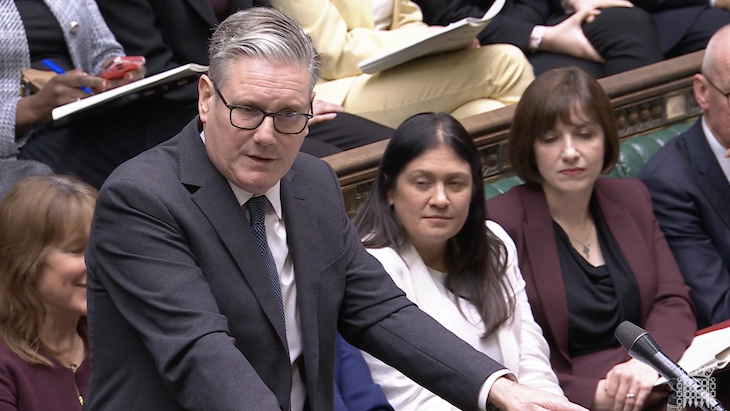
Puccini’s Turandot is back at the Royal Opera in the 40-year old production by Andrei Serban and… well, guilty pleasure is an unfashionable notion these days, but I still feel a batsqueak of shame at enjoying it so much. It’s not the chinoiserie – anyone who believes that an opera based on an 18th-century Italian pantomime should be taken literally is probably beyond help. No, it’s a Spectator headline from years back that still nags. ‘Turandot is a disgusting opera that is beyond redemption’ was the gist of a review of this same staging by the late Michael Tanner, and if it was anyone else you’d put it down to snobbery and move on.
But you can’t do that with Tanner, a thinker of piercing intelligence who spent decades interrogating how opera works and why it matters. We never discussed Turandot, but if we had, I’m certain that his arguments would have been unanswerable. And equally, that I’d still have sneaked along to Covent Garden and felt the same excitement at Calaf’s stroke of the gong, the same surrender as ‘In questa reggia’ steamrollered to its climax, and the same delicious hormone-rush at all that luxuriously stylised love and death.
Perhaps I’d have countered that those pleasures are justification enough. Many (possibly most) of us do secretly enjoy the thrills that Turandot delivers more potently than any other opera: the sensation of being overpowered; the kinky, hot-cold tang of ritual colliding with animal instinct, and cruelty slicing through human warmth at its most vulnerable point. I don’t imagine for one minute that I would have convinced him. For Tanner, opera had the potential (and to some extent, a responsibility) to address the central questions of existence. Having made the mistake of working in the classical music sector, my suspicion was that it’s still basically showbiz.
Certainly, few productions put on as gorgeous a show as Serban’s Turandot – a staging so exuberantly theatrical that you could take a non-opera buff along and they’d actually be entertained. Nothing about it (not even the lighting, which is usually the first thing to go) looks its age. It wears its visual ingenuity as lightly as ever – allusions to Mao-era China layered over Szechuan-spiced orientalism and a playful ground-bass of masks and capers, to remind you that this is a work of the Italian imagination and the terminus of a tradition that stretches back to commedia dell’arte.
It probably helps that the revival director is the excellent Jack Furness. There are details that either weren’t there, or didn’t seem as vivid, in the last revival. A guard booting open a door; Turandot’s sudden, radiant smile in the opera’s very last moments – it felt more spontaneous than a production from 1984 has any right to be. The conductor, Rafael Payare, is a major asset, and he leans hard upon the modernist aspects of Puccini’s score, with metallic colours, sharp edges and a sense of motors whirring in the jagged, steel-toothed ostinati. It’s not every performance of Turandot that reminds you of Les Noces.
Will you feel dirty afterwards? Possibly, but that’s half the fun
As to the cast, for now Sondra Radvanovsky is the Princess, and it’s fantastic how the predatory, industrial-strength brilliance that carries her throughout Act Two (she really does power through some massive choral and orchestral textures) opens out and acquires shadows in the opera’s closing scenes. You hear her thawing long before you see it.
SeokJong Baek (Calaf) can’t muster quite the same wattage but he’s a bullish, determined presence, with a coppered tone and an urgency to his singing (even in ‘Nessun Dorma’) that carries you with him, and makes sense of his apparent callousness to Liu – even a Liu as sweet-sounding as Anna Princeva; whose tremulous suspended high notes brought her an early and deserved ovation. Should you go? Yes: if Turandot floats your boat (which it probably does) this is a splendid revival of an unsurpassed production. Will you feel dirty afterwards? Possibly, but that’s half the fun.
Over at the Wigmore Hall, meanwhile, the Takacs Quartet demonstrated – again – that they really are the best of the very best. The cellist Adrian Brendel joined them in Schubert’s C major String Quintet, and in the two movements that I heard, they’d wholly absorbed Schubert’s ability to suggest, in the same notes, near-stasis and unstoppable forward momentum.
The Takacs Quartet demonstrated that they really are the best of the very best
Earlier they’d brought fervent, tear-stained expression to Janacek’s First Quartet – alternately wry and raw – and positively whirled through Beethoven’s Op.18 No.1. The four players spoke with one perfectly-blended voice in Beethoven’s unison opening gesture, but a bar later their second violin Harumi Rhodes was tearing loose and hurtling the music forward while cellist Andras Fejer disputed drolly from the wings. Once again, they delivered a unanimity that thrives on individualism, and total expressive freedom within the most complex of formal frameworks. You see, fellow humans: it can be done.








Comments